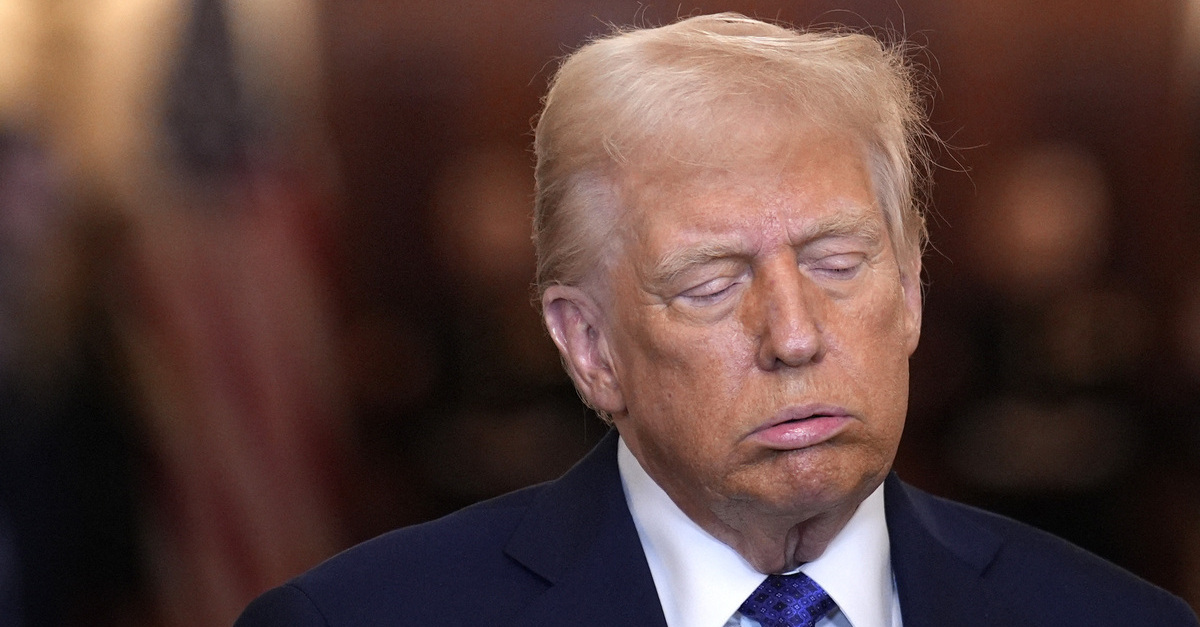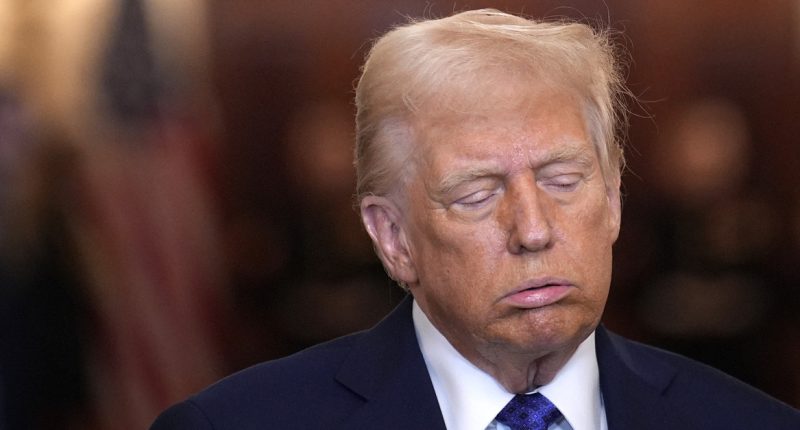
US President Donald Trump arrives before signing the Laken Riley Act into law in the East Room at the White House in Washington on January 29, 2025 (Yuri Gripas/Abaca/Sipa USA/Sipa via AP Images).
A federal judge in Washington, D.C., on Tuesday had some harsh words for the Trump administration as she indefinitely blocked the federal government from implementing a policy that would freeze funding on distributions to federal aid programs.
U.S. District Judge Loren AliKhan issued a preliminary injunction prohibiting the administration from “implementing, giving effect to, or reinstating under a different name” the directives in a controversial Office of Management and Budget (OMB) memo issued last month.
In the 39-page order, the judge noted that OMB had formally rescinded the memo, but called that rescission a “meaningless” and “empty gesture” at best or a “brazen attempt to deprive the court of jurisdiction without actually altering course” at worst.
The injunction effectively extended two temporary restraining orders AliKhan had already placed on the spending freeze after finding that the plaintiffs — a coalition of nonprofit groups — had sufficiently shown that the measure would be “economically catastrophic — and in some circumstances fatal — to their members.”
While AliKhan’s previous restraining orders only lasted 14 days, Tuesday’s order will prevent the funding freeze from going into effect until the court renders a final judgment in the matter or the injunction is overturned by a higher court.
The memo at the heart of the litigation purported to make good on a series of executive orders issued by President Donald Trump outlining the administration’s spending priorities. It stated, in part, that “Federal agencies must temporarily pause all activities related to [the] obligation or disbursement of all Federal financial assistance, and other relevant agency activities that may be implicated by the executive orders, including, but not limited to, financial assistance for foreign aid, nongovernmental organizations, DEI, woke gender ideology, and the green new deal.”
The directive caused mass confusion throughout entities dependent on the federal government for funding as entire payment portals and websites went dark overnight. The memo was quickly rescinded, but the court found that, despite the government’s contentions, the administration was still enforcing the rescinded memo, writing:
[Defendants] start by rehashing the independent-agency theory, claiming that the memorandum “did not itself temporarily pause any federal financial assistance.” For that to be true, Defendants would have the court believe that countless federal agencies, none of which had acted to cut off financial assistance before January 28, suddenly began exercising their own discretion to suspend funding across the board at the exact same time. That would be a remarkable — and unfathomable — coincidence. That this uniform freeze occurred just hours after the memorandum’s issuance would be quite the happenstance, too. Indeed, the record belies Defendants’ assertions. It reflects that after OMB issued its memorandum on January 27, agencies immediately began freezing funds, and after this court entered its TRO, some of those funds were released.
AliKhan also repeatedly hammered White House Press Secretary Karoline Leavitt for essentially saying the quiet part our loud when she “appeared to completely contradict the act of rescission by expressly stating that it was ‘NOT a rescission of the federal funding freeze”” in a post to X, previously Twitter.
Touching on the merits of the case, the court seemingly agreed with Plaintiffs’ claims that OMB’s funding freeze appeared to be “crossing a constitutional line.” AliKhan wrote that, according to federal statute, OMB’s role is “mainly supervisory, rather than directly active,” meaning its authority “falls well short” of actively deciding whether agencies “must temporarily pause” all federal financial assistance.
“Here, Defendants attempted to freeze as much as $3 trillion dollars — the sum total of ‘all activities related to [the] obligation or disbursement of all Federal financial assistance. That is ‘no everyday exercise of federal power,’” the judge wrote. “The scope of power OMB seeks to claim is ‘breathtaking,’ and its ramifications are massive. Because there is no clear statutory hook for this broad assertion of power, Plaintiffs are likely to succeed on the merits of this claim.”
AlliKhan went on to call the funding freeze “ill-conceived from the beginning” in finding that the measure was likely “arbitrary and capricious,” as the government has been hard-pressed to provide any plausible justification its own actions.
“The arbitrary-and-capricious review at this stage of the litigation remains largely unchanged from the court’s earlier opinion. The touchstone of this inquiry is rationality, and Defendants’ actions flunk that test,” the order states. “Defendants still cannot provide a reasonable explanation for why they needed to freeze all federal financial assistance in less than a day to ‘safeguard valuable taxpayer resources.’ Evaluating funding priorities can be done without needing to starve citizens or deny critical health services.”
As she closed the order, AliKhan said the government’s actions following the issuance of her initial TRO had increased the urgent need for injunctive relief, as evidence has shown that the administration has, in some cases, been defying the court’s order.
“To be sure, the government is normally entitled to a presumption of good faith on voluntary cessation. But the court will not confer that presumption when the government says one thing while expressly doing another,” AliKhan wrote, again citing to Leavitt’s social media post. “And it will not reward parties who change appearances without changing conduct.”






